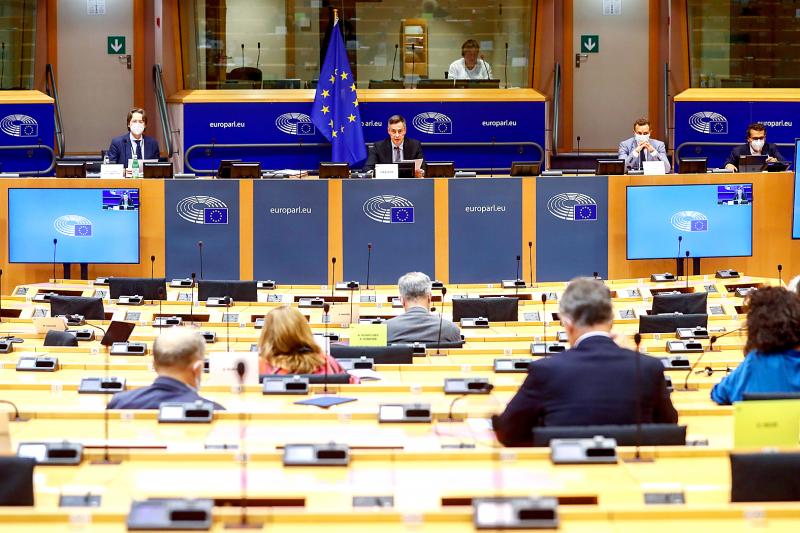The European Parliament Committee on Foreign Affairs on Wednesday approved proposals that urge the EU to bolster political ties with Taiwan and rename its European Economic and Trade Office the “EU Office in Taiwan.”
EU lawmakers passed the EU-Taiwan Political Relations and Cooperation report and related proposals in a 60-4 vote, with six members abstaining.
The report is to be brought to the floor of the European Parliament next month. It expresses concern over China’s saber-rattling, and calls on Beijing to cease any action that jeopardizes peace in the Taiwan Strait and not to upset the “status quo” without Taipei’s consent.

Photo: EPA-EFE
The report recommended that the EU initiate work on a bilateral investment agreement with Taiwan and hold talks with the country at the highest official levels.
The EU should play a larger role in international initiatives that maintain peace across the Strait and improve Taiwan’s democracy, while making it a strategic partner in the Indo-Pacific region, it said.
The report condemned China’s trade embargo on Lithuania and recommended that the EU support the Baltic state in the dispute.
In Taipei, the Ministry of Foreign Affairs in a statement yesterday thanked the committee, saying that the nation looks forward to more milestones in Taiwan-EU ties.
The ministry would closely monitor the European Parliament’s upcoming vote, it said, adding that the report marked the 10th anniversary of a visa-waiver agreement between Taiwan and the EU.
“Taiwan and the EU share the core values of democracy, freedom and human rights as like-minded partners,” it said.
That Taiwan and Lithuania plan to establish representative offices in each other’s capitals is the best illustration of improved relations between Taiwan and the EU, as well as its member states, it said.
“Taiwan does not back down from intimidation and will stand up for the democratic beliefs of the EU, the US, Japan and other like-minded partners,” it added.
The Chinese Mission to the EU issued a statement saying that the bloc had contravened its “one China” principle and betrayed the trust underlying the two entities’ relations.
EU lawmakers should “immediately correct their erroneous speech and action to protect the political foundation of China-EU relations,” Beijing said.
At a news conference in Taipei, the Democratic Progressive Party (DPP) said passage of the report marks a “historic leap” in Taiwan-Europe ties.
The nation should be gladdened by support in the European Parliament for Taiwan’s inclusion in the international community and the resolution for bilateral economic ties, DPP Legislator Tsai Shih-ying (蔡適應) said.
Mention of Taiwan had been avoided in European politics since regional states began switching recognition from the Republic of China to the People’s Republic of China in the 1960s, Tsai said.
This has changed under President Tsai Ing-wen’s (蔡英文) leadership, with strides having been made to re-establish relationships between Taiwan and EU members, and raise awareness of Taiwan’s importance in European public discourse, he said.
Additional reporting by Chien Hui-ju

Conflict with Taiwan could leave China with “massive economic disruption, catastrophic military losses, significant social unrest, and devastating sanctions,” a US think tank said in a report released on Monday. The German Marshall Fund released a report titled If China Attacks Taiwan: The Consequences for China of “Minor Conflict” and “Major War” Scenarios. The report details the “massive” economic, military, social and international costs to China in the event of a minor conflict or major war with Taiwan, estimating that the Chinese People’s Liberation Army (PLA) could sustain losses of more than half of its active-duty ground forces, including 100,000 troops. Understanding Chinese

The Ministry of Foreign Affairs (MOFA) yesterday said it is closely monitoring developments in Venezuela, and would continue to cooperate with democratic allies and work together for regional and global security, stability, and prosperity. The remarks came after the US on Saturday launched a series of airstrikes in Venezuela and kidnapped Venezuelan President Nicolas Maduro, who was later flown to New York along with his wife. The pair face US charges related to drug trafficking and alleged cooperation with gangs designated as terrorist organizations. Maduro has denied the allegations. The ministry said that it is closely monitoring the political and economic situation

‘SLICING METHOD’: In the event of a blockade, the China Coast Guard would intercept Taiwanese ships while its navy would seek to deter foreign intervention China’s military drills around Taiwan this week signaled potential strategies to cut the nation off from energy supplies and foreign military assistance, a US think tank report said. The Chinese People’s Liberation Army (PLA) conducted what it called “Justice Mission 2025” exercises from Monday to Tuesday in five maritime zones and airspace around Taiwan, calling them a warning to “Taiwanese independence” forces. In a report released on Wednesday, the Institute for the Study of War said the exercises effectively simulated blocking shipping routes to major port cities, including Kaohsiung, Keelung and Hualien. Taiwan would be highly vulnerable under such a blockade, because it

UNRELENTING: China attempted cyberattacks on Taiwan’s critical infrastructure 2.63 million times per day last year, up from 1.23 million in 2023, the NSB said China’s cyberarmy has long engaged in cyberattacks against Taiwan’s critical infrastructure, employing diverse and evolving tactics, the National Security Bureau (NSB) said yesterday, adding that cyberattacks on critical energy infrastructure last year increased 10-fold compared with the previous year. The NSB yesterday released a report titled Analysis on China’s Cyber Threats to Taiwan’s Critical Infrastructure in 2025, outlining the number of cyberattacks, major tactics and hacker groups. Taiwan’s national intelligence community identified a large number of cybersecurity incidents last year, the bureau said in a statement. China’s cyberarmy last year launched an average of 2.63 million intrusion attempts per day targeting Taiwan’s critical